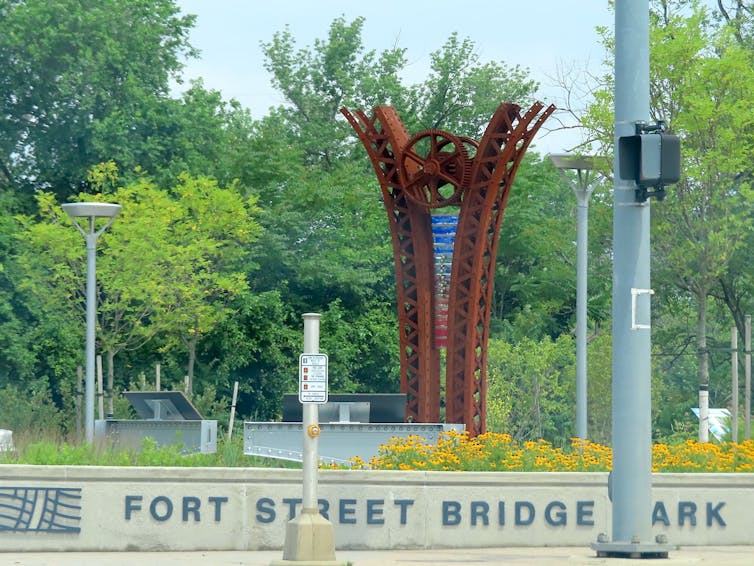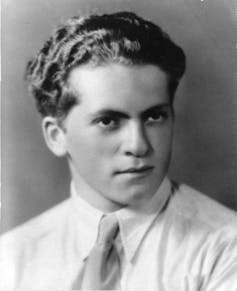
By Paul Draus
The intersection of Fort Street and Oakwood Boulevard in southwest Detroit today functions mostly as a thoroughfare for trucks and commuters.
However, as you sit idling at the stoplight waiting to cross the bridge over the Rouge River, you might glance to the side and see something unexpected in this heavily industrialized area: A sculpture of weathered steel reaches toward the sky alongside a spray of flowers and waves of grasses and people fishing.
This inconspicuous corner, now the home of the Fort Street Bridge Park, has several stories to tell: of a river, a region, a historic conflict and an ongoing struggle.
If you pull over, you’ll enter a place that attempts to pull together threads of history, environment and sustainable redevelopment.
Signs explain why this sculpture and park are here: to honor the memory of protesters who met on this very spot on March 7, 1932, before marching up Miller Road to the massive Ford Rouge River Complex located in the adjacent city of Dearborn.
As a sociology professor, I have a strong interest in how the history of labor and industrial pollution have influenced Detroit.
I’m also interested in the potential for environmental restoration or “green reparations” to offer a new way forward.
To understand this potential future, we must first recognize and honor the past.

Paul Draus, CC BY
14 demands
In their book “Labor’s Untold Story”, published in 1955, journalist Richard Boyer and historian Herbert Morais quote a contemporary account of the Hunger March:
It was early, it was cold when the first of the unemployed Ford workers (many of whom had been laid off the day before) arrived at Baby Creek Bridge. They were a small gray group and they stood slapping their sides, warding off the cold, and wondering if they alone would come.
Others soon joined them: Black and white, men and women, immigrants and American-born. They united to deliver a list of 14 demands to the auto tycoon Henry Ford, whose $5 daily wage for his workers was once considered revolutionary.
Among the marchers’ demands: jobs for laid-off workers, a seven-hour workday without a pay reduction, two 15-minute rest periods a day, an end to discrimination against Black workers and the right to organize.
This crowd of several thousand marched up the road on one of the coldest days of winter. They were greeted at the Dearborn border with clouds of tear gas, jets of cold water and a shower of bullets.
It was then that the Ford Hunger March became the Ford Massacre.
The seeds of a labor movement
Beth Tompkins Bates, in her book “The Making of Black Detroit in the Age of Henry Ford,” wrote that “The response of the Ford Motor Company on that day shot holes in the myth that Ford cared about his workers, that he was different from other businessmen.”

Walter P. Reuther Library
At the end of the day, four marchers lay dead, while many others were injured and hospitalized. A fifth would die months later of his wounds.
More than 30,000 people showed up for the dead marchers’ funerals. The violent reactions of Ford security and Dearborn police during the march were widely condemned.
In an effort to address the stain on its public image, the Ford family first commissioned then expanded a major work by Mexican muralist Diego Rivera that was to become the centerpiece of the Detroit Institute of Arts, known as the Detroit Industry Mural. Rivera, a known communist, depicted both ruthless efficiency and the racialized inequality of the industrial process.
Ford’s battle against unions was ultimately a failure. Five years after the Hunger March, the so-called “Battle of the Overpass” led to the organization of the Rouge plant by the United Auto Workers.
The Ford Hunger March, long forgotten by many, is now acknowledged as an important catalyst in the growth of the union movement.
Struggle for sustainability and justice
The fight for sustainability and environmental justice is another major theme of the park, which chronicles the history of the Rouge River, including the day in 1969 when the oily water infamously caught fire.
The hellish image of burning rivers helped motivate the signing of the Clean Air and Clean Water acts, as well as the creation of the Environmental Protection Agency.
The air and water in and around Detroit are much cleaner today than they were 1969. But this doesn’t change the fact that the area where the park sits bears a disproportionate burden of the pollution generated by the region’s industrial production, which includes cement plants, gypsum and aggregates processors, salt mining and asphalt storage, as well as a steel mill and petroleum refinery.
Another donor to the park is Marathon Petroleum Corporation whose Detroit Refinery occupies the adjoining neighborhood. Though Marathon has invested in the development of green spaces on its own property, the refinery has also expanded in recent years, further degrading the local environment.
Research shows that workers benefit from unionization in myriad ways, not only directly but indirectly. But recent labor victories by the UAW, Hollywood writers and other organizers stand in stark contrast to the long-term erosion of union membership.
Today, the Fort Street Bridge Park in southwest Detroit serves to remind us of the complexities of history and how apparent progress in one area may be followed by a setback somewhere else. It also represents how the spirit of community, unbroken, keeps pushing for something better.
![]()
Paul Draus is Professor of Sociology and Director and Master of Science in Criminology and Criminal Justice at the University of Michigan-Dearborn.





























Deirdre Rutledge says
Sounds familiar – kind of like when starving people rush to humanitarian trucks to get food and they’re massacred by soldiers with guns.
Dennis C Rathsam says
Henry Ford was a racist, & had many young men killed. It was his way or the hyway. Thank god for the UAW!
Sherry says
OMG! This is certainly something I did NOT learn in my American history classes. Is this the good ole days trump and his supporters yearn for? I certainly hope not. . .
joe says
I went to college in the late 70’s and it was my first exposure to the American history that the fairy tale version I learned through grammar school and high school never revealed, like the story above. The Industrial Revolution and modern capitalism were not unanimously cheered by the common citizens like we were told.
One of the dangers of the fascist movement is to cleanse our history of such realities. Read the book “Strike” by Jeremy Brecher – it was the formative book my History teacher introduced us to back then – it will open your eyes. I see that it has been updated, which may make me revisit it.
Ban the gop says
has anything really changed? a lot of companies skirt all legal requirements and are provided loopholes to not do things they dont want. It seems to me that all the laws protect the corporate powers and interest and could care less about the average worker.
Sherry says
Ban. . . you’ve certainly got that right! Just check out the horrific stories of “child” labor (especially migrants) illegally being used in slaughterhouses today! The owners pay off the inspectors who only do their inspections at “certain” hours.
Pogo says
@…has anything really changed?
No.
https://www.google.com/search?q=Republican+Party+hostility+to+worker+rights+and+safety
Hell no.
https://www.google.com/search?q=Republican+Party+opposition+to+worker+rights+and+safety